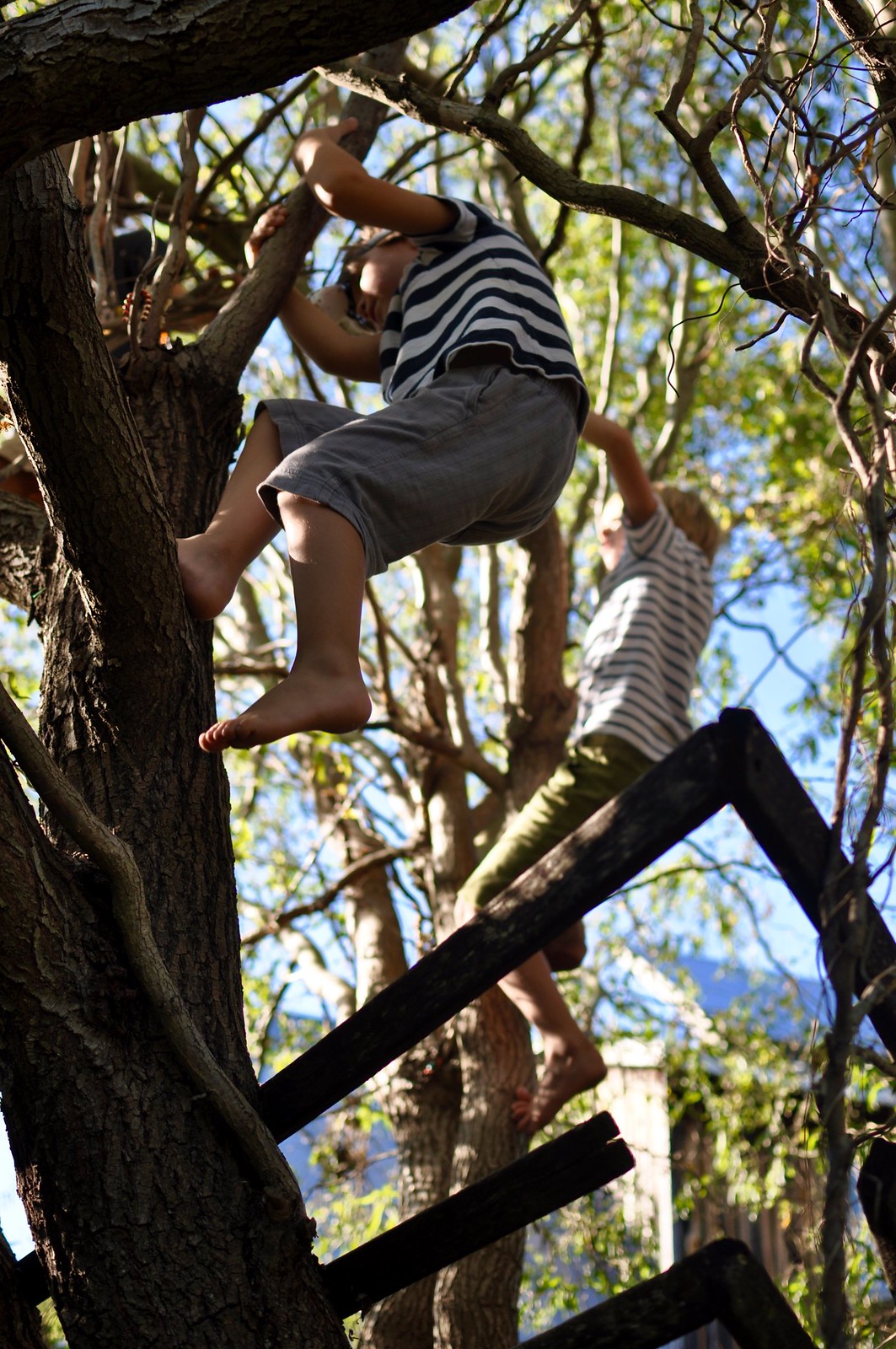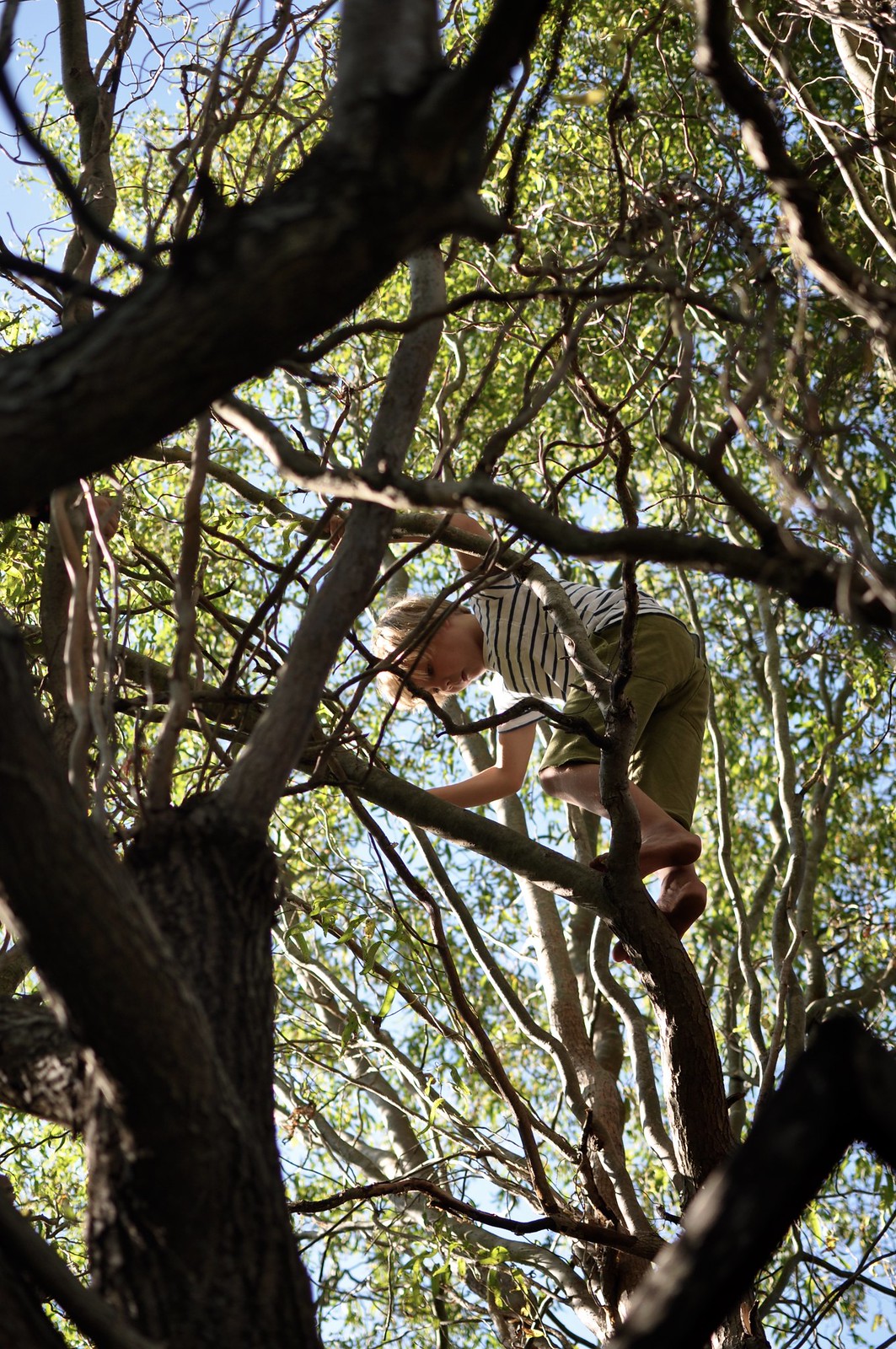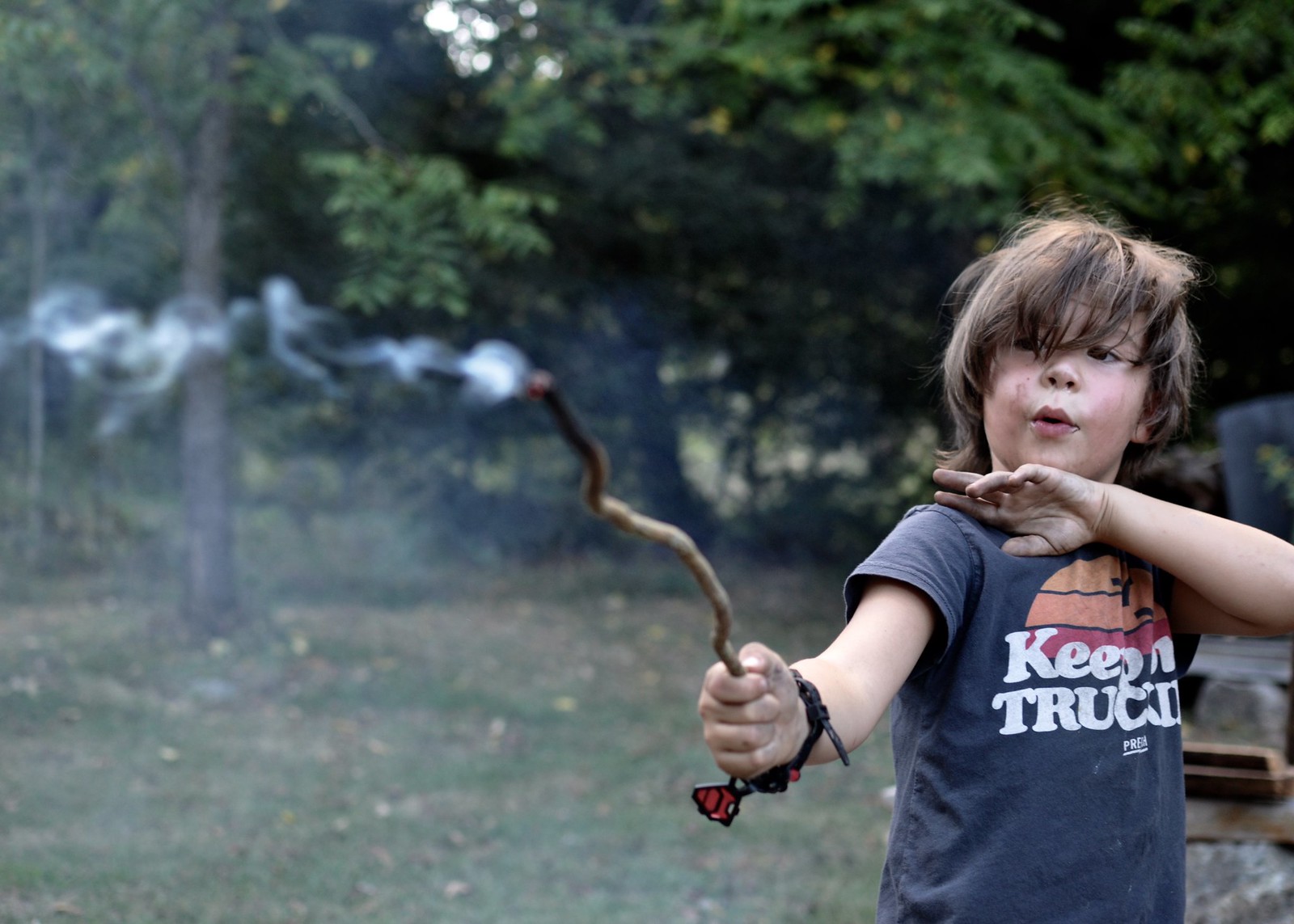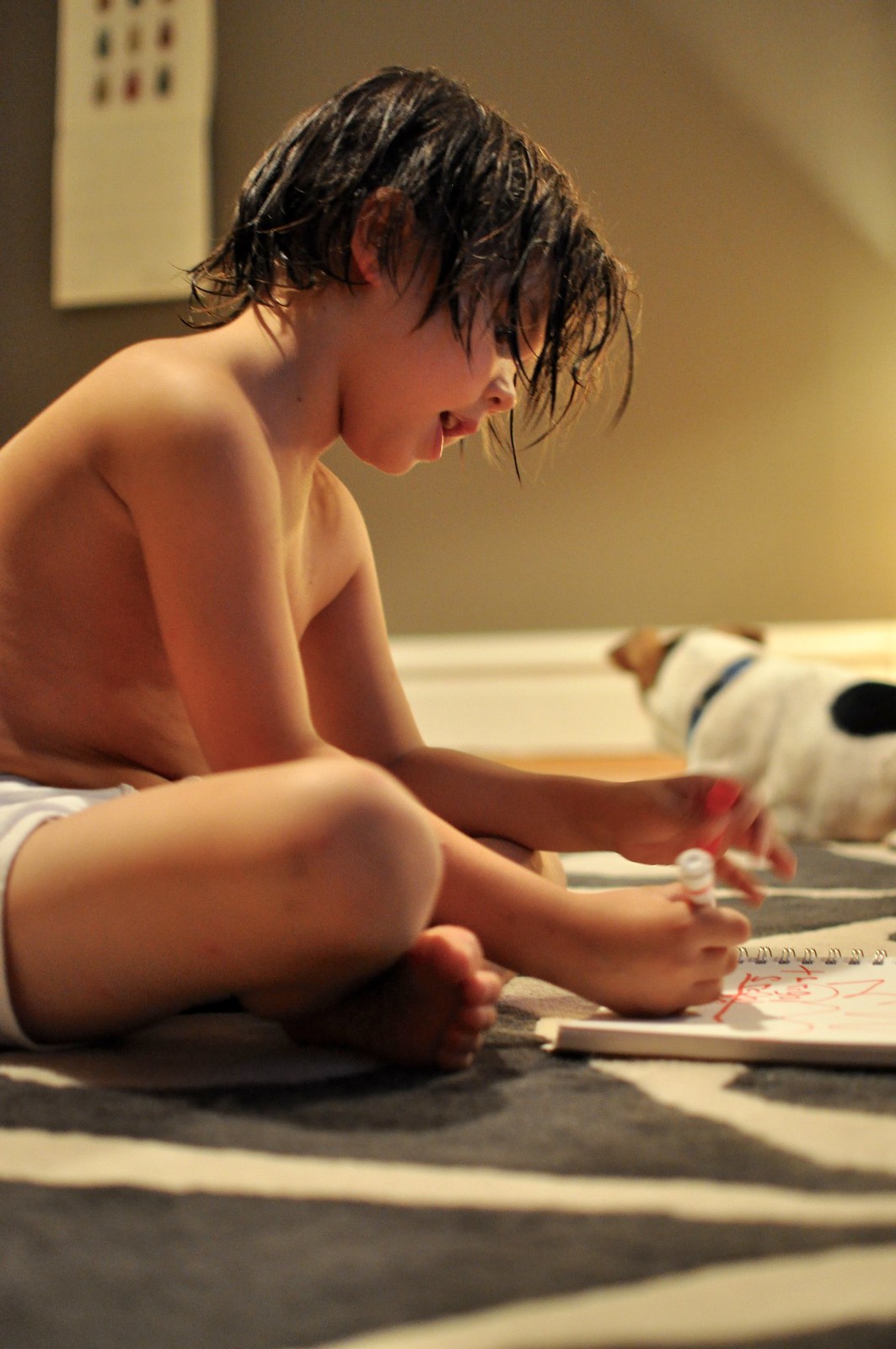I had an interesting discussion with a nanny at the playground after school one day earlier this week. The weather was beautiful and as a result, my boys had pretty much thrown their lunch boxes on the floor inside the door, turned on their heels, and ran directly back outside, making a beeline for the playground down the street. A long time after we had arrived, the nanny brought the three kids she has looked after for the past few years (we have had many, many discussions as a result) and as she sat down on the wall next to me, she lamented over how they would have made it outside much earlier had the kids not had so much homework. She went on to say that the youngest (a spunky four-year-old who gets along so nicely with Emil) had pages and pages of it! I think my eyebrows raised in shock, but I smiled knowingly, even though it was all an act. Emil has no homework. And neither do Milo or Oliver. And I’m so, so relieved.
When Milo attended public school for kindergarten, he used to come home at the beginning of each week with a big packet of worksheets, all stapled together, to be completed for the following Monday. He had all week to work on it, and at first didn’t seem to mind. He would do all the worksheets at once, usually the day after he received them. But as time wore on, he started to fret and complain about it. And he brought to our attention, on more than one occasion, that the packets were sometimes repeats of previous weeks… as in, the exact same packet of worksheets. At the time, we just encouraged him to complete them anyway, to get through the busywork so he could move on to what he wanted to do. But as we moved forward throughout the school year, we found ourselves really struggling to support the homework policy. Doing the packet of work seemed like checking a bunch of boxes, or coloring within the lines of a drawing sheet over and over again. It seemed to me that we were training our kindergartener for a lifetime of drudgery, of unquestioning, boring, uncreative, uninspiring busywork. I began to realize that this is why kids sometimes dread going to school. And to top it all off, what Milo really wanted to be doing at the time was read, a skill he had recently grasped and wanted to spend every extra moment perfecting. To be taking him away from learning, real actual learning, to complete a bunch of worksheets, just killed something inside of me. It seemed so backwards. It was one of the reasons we really started to question the status quo of public school learning.
There is within every human being a deep and unrelenting desire and need to learn. We are born with it; we cannot escape it even if we try. We learn to crawl, to walk, to speak the language that is spoken around us. We learn to read the facial expressions of people around us. We learn how to dress and feed ourselves. We learn to leave bees alone once they sting us. We learn how to carry a glass of water without spilling it. We learn, without trying, because we are curious, because we are human.
There is typically no homework for the Montessori child. The reasons are many, but mainly this: Dr. Montessori believed that if we do not dictate the work of a child in class, then it does not make sense to dictate the work they choose at home. Montessorians understand that children spend all day in the classroom learning, and they need their afternoons and evenings to “pursue their personal interests, interact with their families, and relax” (read more here). It is during this after-school time when children can breathe a sigh of relief and just be home. Imagine how you feel, if you work outside the home, when you open your front door and step inside. If you have more work to come home to, there might be that feeling of dread, or that the work day is still not over. But if you step inside knowing there is no more work looming over your head, you feel that sense of relief that you are home, you can relax, you can just be. Children need that feeling, too!
And something happens when we give our children the freedom to choose how they spend their time after school. There will be days when my boys all come home tired and choose to go to their own separate spaces: one with a book on the couch, another building with legos or magnatiles on the floor, and the other doing origami at the kitchen table. Other days, they tear around the back yard together, leaping and running, or playing frisbee or soccer together. Then they move on to something else, like playing store together and creating their own paper money which resembles real money, counting and exchanging and buying things from each other. All of these things they choose to do they are actively engaged in and learning from, because they have chosen it themselves. And it is a miraculous thing to watch unfold.
Also? They do homework. They get out pieces of paper and write out math problems for themselves to solve. They challenge each other to solve the other one’s math problem! Milo helps Oliver when he gets stuck on a problem. I kid you not, they love to learn. All children do. I have also heard of older Montessori students asking for homework if a particular subject or lesson has caught their interest — and in this case, of course I love the idea of them focusing their attention on the subject just because they are enthusiastic about it. I am so completely and totally in love with this Montessori method, and to have opened my mind to a different way of learning. I have learned so much about trusting my children and their natural capacity to develop as, well, humans. It is just a marvelous thing.






Is the no-homework policy true as they children age into middle school and high school? do Montessori schools exist for older grades? I am fairly unfamiliar but from what you feature on your blog, the school philosophy does sound interesting.
A Wash U psych professor commented on different kinds of homework in an NPR article 2 days ago:
http://ww2.kqed.org/mindshift/2015/09/22/what-kinds-of-homework-seem-to-be-most-effective/
Packets of worksheets in kindergarten would annoy me to no end! I’m not sure if I’d be more annoyed that my kids had to do them, or just the sheer amount of copy paper consumed on a weekly basis!
I really do love interest based learning – be it Montessori or Reggio Emilia or any number of other educational models. Our elementary school borrows from a number of these models and we’ve been so very pleased. I think it really hit home to us when our oldest moved onto a public / magnet accelerated middle school last year. She was not only prepared, she thrived. In the upper elementary grades they do have some out of class work – but it’s project based or writing based – not homework worksheet packets of busy work. She loves projects because she’s such a visual learner and really creative / artistic. I have no problem seeing her spread out on her bedroom floor or across the dining room table with markers and paper and tape and glue because I know she really loves it, and most of the time that’s what she’s doing anyway. The little one gets very excited when she has home tasks to do too – like gathering up objects on a walk for a terrarium or picking out photographs to bring to school for writing prompts. She calls this “homework” and feels like big stuff.
And I agree that kids WANT to learn, especially when they are excited about something. My oldest worked on two logic problems yesterday that she got so excited about. When I picked her up she asked me if she could have three logic problem books for Christmas. I mean, I loved learning as a kid, but I don’t think I would have ever used up my precious Christmas wishes on math books! 🙂
When you talked about Milo just wanting to read – it reminded me of something I thought of several years ago. If we ever find ourselves so busy that we don’t have time to read, then we are doing too much. So far, so good. The girls always have their heads in a book, even when I need them to actually do something, like put on their shoes or brush their teeth!
I’m curious too about middle school and high school, but you can ignore that if you want to. I don’t like thinking too far ahead with my kids because the years are just rocketing by already.
In general my 4th grader does not have homework besides reading. But there is the memorization of math facts (addition, subtraction, multiplication, etc.) that we work on at home. How does Montessori handle that?
Rosie, Kristin, and Jennifer… all great questions! The school our boys attend goes through sixth grade. I’ll have to ask the director about middle school, etc. as it refers to homework and Montessori. I’ll be sure to repost or follow up when I do! Thanks for the great dialogue, as usual.
I’m really torn on this subject.
On the one hand, I think bogging down little people with endless worksheets and assignments is ridiculous and exhausting. And, frankly, it’s usually the parents who police it. Additionally, seeing how much homework my babysitters have in today’s high school shocks me. Being in school from 8 to 3, then heading home to work on 3+ hrs of homework a night is totally counterproductive. Not to mention keeps them from fully engaging in extracurricular stuff or ya know, hanging out with friends doing NOTHING. There is value in letting your brain flat line and/or developing your experiences through social interactions. I found college to be infinitely easier than high school-mostly because I could elect what I was learning (*shakes fist at sky* “screw you calculus!”)-but also because 3 classes a day with moderate reading and studying, self-regulation and papers was a deeper dive than I’d ever experienced. Plus, it left time for beer. This is extremely important.
On the flip side, my eldest’s elementary school starts homework in 1st grade. At first, this really annoyed me. It was a lot of writing and basic math sheets and reading logs. It drained the joy out of learning for him and me. That said, it aided the teachers in understanding what was really being absorbed and what wasn’t. They reviewed a lot of basic stuff as they could see-via homework, no less- that some students weren’t keeping up. Additionally, it helps me stay really involved in what my kid is studying and me generally more clicked into their curriculum. The general idea the school is pushing is to start good study habits early on so that when they reach middle and high school and even college they will have strong self-discipline established for what will be expected. That’s what they’re selling anyway. Each year, the grades have 4 large presentations to give that are based on the multiple intelligences model. Research, deciding on how to present, rehearsing and actually doing it are skills kids will use until they retire.
This has drastically changed my appreciation of where my youngest is in pre-school though. I wish they would spend more time working on letters and writing than play-based learning. I can see that my oldest is behind because we didn’t give him those skills early enough.
So, again, I’m torn. But what we can all take away from this is beer is important.
Maggie, great point, and one which I think really highlights the differences between more traditional education and Montessori education. In Montessori lower elementary (and upper elementary, for that matter), children are self-directed. They have to record all of their work and use of time in a journal throughout the day, then they have regular conferences with the teacher (one-on-one) in which they discuss and assess progress and struggles. As a result, the child is learning the time management and study skills (and overall self-regulation) that other kids may only experience during their at-home time, when they have to self-direct to homework. So, the differences make sense. And hey, if it makes you feel more in-touch with your child and how he is doing, it must be working for you and your family and that is hugely important!
I talked (briefly) with the director of our school about your questions, and she had a really good response, which was something to the effect of, why do we focus on the at-home time as necessary for learning these skills (study skills, time management, extra practice in an area, etc.)? They are learning to do all these things and more during the school day, and there is no research to support the benefits of doing homework in elementary school (in high school, the benefits are minimal and seem to have more to do with income than anything else). I can’t wait to talk more to her about this, and I will follow up with a Montessori: On Homework, Part 2 post! There’s just so much to say on the topic!
Maggie – I’ve felt the same thing about our babysitters’ high school workloads too. But then again, they are all highly motivated, bright kids and they chose that route at school, so choice does make a big difference. When I think back to architecture school, all I can remember is HOW MUCH WORK we did – during classes and outside of classes. Architecture students get this reputation that they spend 22 hours a day in studio, and it’s not that far off. But when you are passionate about the work it seems different.
We try to monitor our middle schooler’s take on her homework. When she’s really engaged and going above and beyond on a particular project, then we let her run with it. When she seems like she’s annoyed with a task we intervene a bit and talk about the big picture – what has to be done by the deadline? How can she divide into easier pieces and conquer? 6th grade was a great practice year for that, she’s doing really well in 7th grade with it. I think those are really critical life skills.
I think the baseline rule of thumb is usually 10 minutes a night per grade level – and that should really include any sort of practice outside of traditional homework. Both of my girls play the violin as part of their school curriculum, and we’ve integrated practice time into our evening routine. They take turns playing while we’re making dinner, and it’s sort of like pre-dinner music. I love it.
I have to ask Maggie (if she comes back to read these) if she’s local, because she mentioned MI, and our firm designed the first MI library at a school nearby. 🙂
Kristin,
I am local! I suspect you’ve got the correct school in mind.
I agree with so much of this! My youngest two kids go to a Montessori preschool. My first and third graders go to a traditional elementary school which we love for many reasons (people, neighborhood, etc…). However, there are times when part of me yearns to homeschool (which I know I could never, ever do), or switch them to a Montessori-type of elementary school. And when I have those moments of fleetingly imagining them in a different environment, it’s usually due to homework.
My first grader gets a sheet a night. It’s not hard for her, doesn’t take long, and thankfully there are no repeats, but it seems a bit ridiculous after spending all day in class doing work, to do…more work. She also has a reading log, which again, isn’t horrible, since we’d be reading anyway. But the fact that we have to do the sheet every night does hang over all of our heads, and it did when my oldest was in first grade as well.
My third grader also has homework. Again, usually a sheet of math problems, or reading something from his science book, and it doesn’t take long. I’d rather he be playing outside, but he can usually get the sheet done while in the car on the ride from his school to the preschool to pick up his younger siblings. So far I’ve found that he still has plenty of time to play. It’s not a struggle to get him to do it, I do not have to stand over him like I still do for my first grader just to keep her on task, and it allows me to see how he’s doing it and doing at it (common core math…I’m actually surprisingly impressed by it). But I’d much rather he not have the sheet at all when he’s already been in school all day. I’m also concerned it will escalate–if not during this year, next, and so on.
What I do like, however, and think is appropriate for his age and grade, is the introduction of projects. He’s turning his first one in tomorrow. It’s a “book report,” but they have great freedom on how they report and present the project, and he’s had a month to read and prepare. His only requirement was to pick one (out of five) Kate DiCamillo book, and then be creative, as long as someone who hadn’t read the book can garner a fairly good idea of what the book is about from his project. He read “The Miraculous Journey of Edward Tulane,” and made a map and timeline of all the places Edward traveled. He loves to read and is artistic, so it was such a fun project, and largely self directed! We looked at maps-both real, and literary ones found in books such as “The Hobbit” and Narnia series, several of William Joyce’s picture books, etc…He had to get the actual maps fairly accurate, like estimating where England is in comparison to the U.S., where the Appalachian mountains are, where in Tennessee is Memphis, and then use clues from the novel to guess where some of the other, unnamed, places may be. We talked time lines and about the decades in which the book took place. How would this character be dressed? What was going on in America at this time? We looked at the literary maps, to see how authors and illustrators used creativity to tell more than just the geographic facts, how they give us clues to the unfolding story, the characters personalities, etc…It was a fascinating project that I was glad to be a part of, and be present to prod him with another question, to examine another aspect of history or the story or to simply talk about human nature with him, which is so beautifully explored in this novel (it was the first novel, other than when Cedric Diggory dies in the 4th Harry Potter, that he wept over. It’s a beautiful thing when an 8 year old boy is that moved by a book).
This week, as he worked on his map, there were several times I’d wished he’d been outside playing with his sisters. But this project was also a good lesson for both of us on time management–doing increments each afternoon, and THEN going out to play or have a friend over. And yes, he still had time to play outside and read for fun.
Elementary homework: I absolutely hate after school worksheets. HATE them. I can see the value of going over things like math facts if kids need a little extra attention in that area or if they learn from rote drills like flash cards (I was that kid, in math), but overall, I can do without the extra stuff unless it’s reeeaaaalllly needed. Even then, though, I wonder if more fresh air and play is needed to allow their brains to breath and process everything, not drills. But I am okay with projects as long as the kids are old enough, and there is enough time to do them.
I can’t help but think that homework is really necessary for the children coming from families that don’t encourage exploration and reading and what not. For the kids that would just come home and watch tv or play video games until bedtime. For the kids that are so woefully behind because they didn’t go to preschool or get exposed to books and writing. I taught preschool in an affluent area, and about half my 3 year olds had literally never held a crayon. They colored on the ipad, but not on paper. Doing those horrible worksheets is probably building up their fine motor muscles that they would never develop with their parents otherwise. Of course, realistically, the children that really need it are probably the ones who never complete it. 🙂
This being said…I think much of the homework being sent home is too much busywork. Just too much in general. But I try to spin it to my kids that there will always be things in life you just have to do. Like taxes, paying the bills, folding laundry, writing thank you notes, etc. A little daily lesson that life isn’t always what you want to do…sometimes it is what you have to do to play the game. (That being said, I set that timer for 10 minutes per grade, and if they are not done when that timer goes off, I write a note to the teacher and send them out to play)
I’m a teacher and literacy consultant and have spent my career working in schools in low-income areas; much of my work is in “progressive” public schools where materials-rich, project-based, student-centered learning (i.e. play) is the norm. Of course, I agree that children’s work should be their play; through play, they develop executive function, creativity, language, spatial awareness, and a sense of confidence. I also know first-hand that most of the public schools in our country adhere to a skills-based model, which is often monotonous, overly-disciplined and all too often, ineffective. Child-centered schools–whether they are Montessori, Waldorf, or just generally progressive–are often reserved for the wealthy.
In order for more progressive public schools to exist in more communities, we need all families to opt in to their public schools and “be the change”. When we pull our own children out to send them to a more idyllic, philosophically palatable fit– and I understand the desire to do that with my own boys–then we leave lots of kids, and the health of our neighborhood communities, behind. We also help to perpetuate the segregated, skills-based, unhealthy schools we criticize.
I find this really interesting, and I’ve thought a lot about what Kate mentions. We ended up sending our three year old to a Montessori preschool (though after MUCH deliberation, we ultimately decided on one in a location somewhat more convenient for us) but I wonder about enrolling her in traditional school after (this school ends after kindergarten). Since we live in the city, we’re obviously involved in the public vs. private school debate, and I sometimes feel torn between being the best parent I can be and being the best citizen I can be. I believe wholeheartedly we need to “be the change.” I also don’t want to sacrifice my child’s education waiting for those ideals to be realized. It feels like a hard choice, when what we’d all like is for it not to have to be a choice at all.
As for homework… I went to a traditional public school and I never remember having homework until middle school, and that seems about right to me. My husband defends homework on all the reasons articulated by other commenters, but he’s on the Montessori bandwagon these days.
Kate, I agree with everything you say about families opting in to their public schools *in theory.* We were those people with our oldest son, going into a situation we had heard was tricky with grand plans to change the system, be involved, and “be the change.” Unfortunately, as is the case in many situations, the reality is a lot more difficult.
What happens when your kindergartener goes into a situation where violence within the classroom is the norm? When chairs and desks are thrown, obscenities shouted, and much time is spent in the hallway waiting for behaviors within the classroom to be dealt with? What happens when you, as the parent, witness this on your way into the school to volunteer your time in his classroom? What happens when you witness teachers berating students in the hallway right in front of you? What do you do when your previously peaceful, talk-it-out kindergartener starts coming home after school and to express his frustration, he throws things like the ottoman in the living room or his glass of water, because this is what he sees all day? What then? What about when you’ve expressed your concerns to the administration and teacher and principal and those concerns are met with nonchalance? How do you feel when you, and other parents, are brushed off? Then, what happens when a gun comes to school on the elementary bus and nothing is done to address that?
All of the above things happened to us when we sent our 5-year-old to the local public school for kindergarten. We stuck it out the whole year, even through some really bad stuff (and I was a school counselor in a behavioral school before having kids, so I’ve seen it all). And then we made the decision that the system was so broken that we couldn’t do it. I am sorry, but when it’s that bad, there is more that needs to be done than rallying the neighbors and convincing them all to send their kids to this school. It’s one thing to put yourself in harm’s way, a whole different story to send your kid into a situation like that. It sucks, and there’s no easy fix. But our decision to send our kids to a private school had as much to do with safety as it did with the lack of joy, lack of innovation, and the bureaucratic nightmare in the upper levels of the administration we experienced.
P.s. — I don’t mean for my comment to be inflammatory, just brutally, brutally honest.
I have such a difficult time seeing any benefit in giving homework to elementary aged kids. (But then, I realize, I’m a bit of a rebel when it comes to educational topics.)
For me, there is so much value in “down-time” for our kids. Playing, free choice reading, drawing, physical activities, or simply watching parents accomplish household tasks, are all important educational tools that our children need desperately. Additionally, I feel that family time is incredibly important. Homework, as well meaning as it may be in certain scenarios, robs our children of the opportunity to participate in many of these things on a consistent basis.
For three years I participated in the public school program in our area. The teachers were loving, kind individuals who wanted my kids to succeed wholeheartedly. But time and time again they were unable to provide my children with the tools for success due to administrative and bureaucratic regulations. I did everything within my power to influence these rules: I volunteered, I joined PTA, I voted in school board elections, I raised my voice in protest as politely as I could.
But there came a time when opting out was the only viable option left to me. So we did.
My choice and experience will not be the same as others, and that is fine. I think we can all learn from each other- I know I have changed my mind on certain matters as I’ve listened to others. But when it comes to mandatory, daily homework for elementary students, I firmly believe we are doing our children a giant disservice.